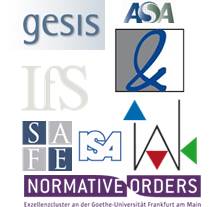Research Units
- Sociological Theory, History of Sociology, and Philosophy of Science
- Empirical Social Research Methods
- Social Stratification, Social Inequality, and Education
- Microsociology, Social Psychology, and Culture
- Gender, Diversity, and Migration
- Sociology of Economics, Work, and Organizations
- Knowledge, Technology, and Environment
Social Stratification, Social Inequality, and Education
Profile
We are concerned with the relationships between actors and their social positions in society from a sociological perspective. Membership in certain social groups is frequently linked to different resources and life chances, which constitutes social inequality. We investigate in which ways social institutions, such as the economic system, the labour market, social policies or the educational system produce social inequalities and which consequences these inequalities have for the life chances, attitudes and behaviour of actors, households and social groups.
Questions we address (examples):
Why do working-class children and children with a migration background study less often than children of highly educated parents and children whose parents were born in Germany? To what extent are upward and downward mobility as well as affiliation to classes and social strata dependent on a country’s political and societal conditions? How do social positions change due to migration and transnationalization processes? In which way and with which consequences do social groups distance themselves from each other? How do hierarchies evolve between groups and how are these hierarchies perceived and interpreted? How is social inequality justified and what role does especially the meritocratic principle play? How are gender inequalities in the labour market related to family and education policy? How large are the career disadvantages of mothers and fathers in different countries? How do these processes change over time?
Courses
In teaching, the research unit is in charge of the modules on “Social Stratification and Social Inequality” in the re-accredited Bachelor and Masters programme. Within these modules, we offer both introductory and advanced courses. These encompass fundamental theories of social inequality, overviews of social stratification or social policy in Germany and in an international comparison as well as courses on more specific topics, such as the transnationalization of social inequality, wealth and the global upper classes, educational inequality, poverty and precarity, interpretative patterns of social inequality, labour market, family and life course. Our research unit is also involved in the teaching degree programmes, where we offer special courses.
Students of the BA in Sociology should begin Module SOZ-BA-1 with an introductory course. These are labelled as such in the course title (e.g. Introduction to the Sociology of Inequality, Introduction to Social Stratification).
Should students be interested in these fields as examination topics, then the team in this research unit are the right people to contact.
spokesperson: Prof. Dr. Birgit Becker







